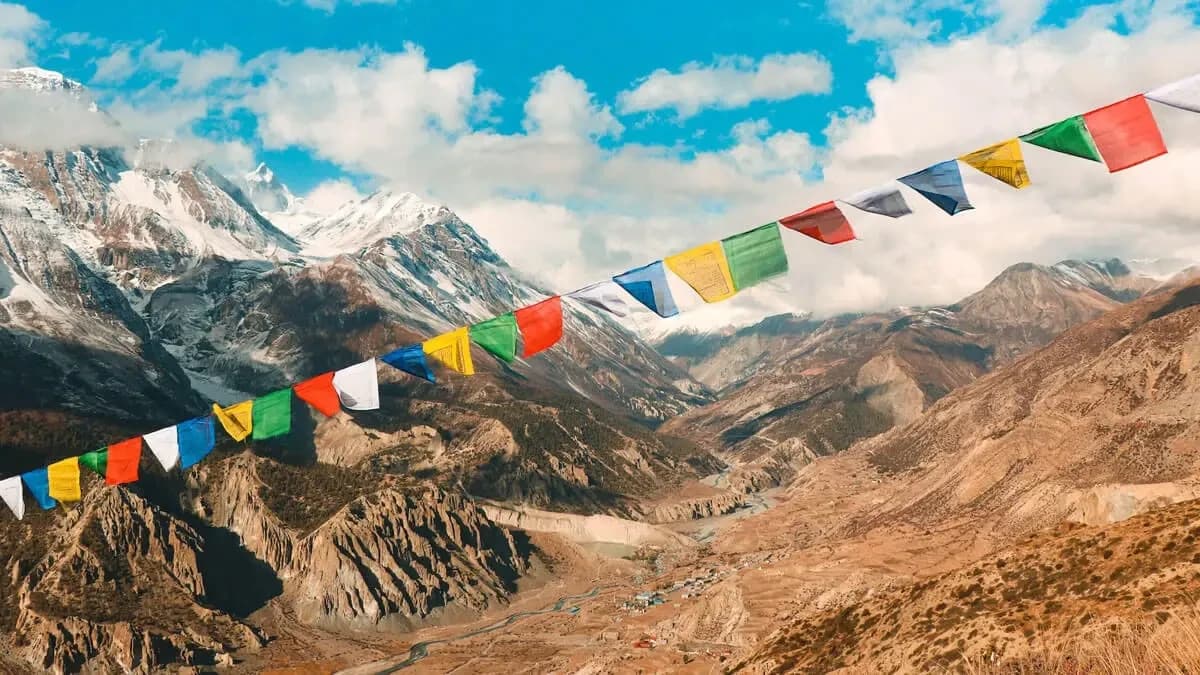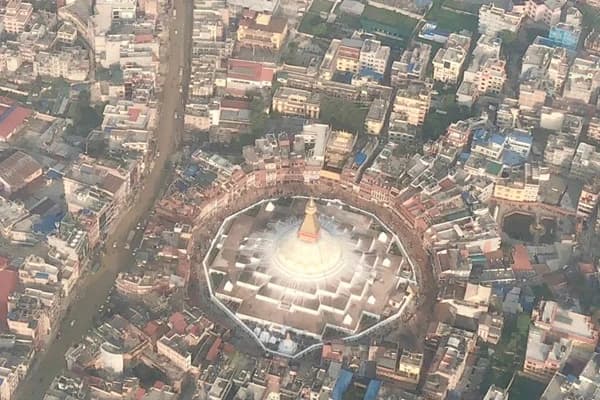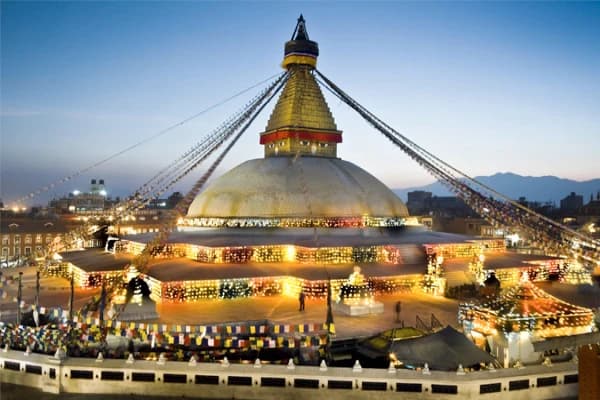It is one of the most iconic world adventures, and it involves breathtaking landscapes, human physical endurance, and bonding with nature and culture. However, the ultimate question on every person's mind is, why is Everest Base Camp Trek popular? Standing right at the foot of the world's highest mountain, Mount Everest possesses a charm that no other mountain has, and trekkers around the globe would want to experience its grandeur.
With a carefully planned Everest Base Camp Trek itinerary, trekkers can immerse themselves in the entire adventure and focus on every step to explore the striking scenery and rich culture of the area's Sherpas.
A brief overview of Everest Base Camp Trek

The EBC Trek is an exciting, adventurous, and challenging trek into Nepal's fabulous Everest Region. From the pulsating city of Kathmandu, the trekkers take a flight to Lukla and begin their trek across Sherpa villages, heavy forests, and high-altitude areas. The trek ends at EBC, 5,364 meters (17,598 feet) above sea level, which offers great views of Mount Everest and the other peaks of the Himalayas. Physically and mentally, this is a very strenuous trek; nevertheless, it is rewarding.
Why is Everest Base Camp Popular as a Trekking Destination Worldwide?
- Iconic Destination: Standing at the foot of the highest peak on Earth, Mount Everest, is a dream for many adventurers; hence, it has to be an iconic trek.
- Unmatched Scenic Beauty: The trek offers stunning views of the Himalayas, including Mt. Everest, Lhotse, Nuptse, and Ama Dablam, with glaciers, icefalls, and dramatic landscapes that are unique to the region.
- Cultural Experience: The trail would pass through Sherpa villages, allowing the trekkers to experience the people's rich culture and traditions, visit old monasteries, and understand their way of life.
- Sense of Accomplishment: Reaching EBC offers the trekkers pride and fulfillment, further enhanced by the trek's strenuous nature and high altitude.
- Accessible for All Levels: It contains various trails, making it suitable for a wide range of trekkers-from the advanced adventurer to those just starting. Thus, it would be appropriate for individuals with varied levels of physical fitness and trekking experience.
- A Spiritual Journey: A combination of natural beauty with cultural significance, as personified in the monasteries and nunneries, transforms this into something spiritual for many trekkers. It gives moments of quiet reflection along the way.
- Well-Defined Trekking Route: The Everest base camp trekking route is well-defined and easy to follow. It also benefits from guides and porters, who greatly ensure safety and support for trekkers.
- Best Trekking Seasons: Spring and autumn are the best time to trek to Everest Base Camp. Trekkers are assured of good weather and clear views, making this an ideal time to start the adventure.
The Ultimate Himalayan Adventure

The challenging yet rewarding experience
EBC Trekking is not for the weak; it requires physical stamina and mental toughness. The total length is about 130 km, and steep ascents, altitude issues, and unstable weather conditions invite altitude sickness. The body needs time to acclimate to the decreasing air pressure.
Wherever there is a challenge, there's something to look out for that compensates; this may be just a new altitude, suspension, or simply looking at the sun setting over the white Himalayas. The view of EBC standing at 5,364 meters or 17,598 feet above sea level would make everything you have passed through worthwhile. It is a journey that tests you; it rewards you with lifetime memories.
How the trek offers an authentic taste of adventure in the heart of the Himalayas
- This route passes through magnificent landscapes, from thick forests and alpine meadows to glaciers and rugged terrain, providing trekkers with a close-up view of the world's tallest peaks.
- On the way to EBC, trekkers meet the Sherpa people, visit ancient monasteries, and enjoy the traditional lifestyle in the faraway mountain villages.
- A part of this trail passes through areas hardly touched by modern civilization, allowing one to experience the raw beauty and isolation of the Himalayas.
- In nature, altitude, obstacle-laden terrain, and steep ascents make the trek physically demanding, testing your stamina and mental strength while rewarding a fulfilling sense of achievement.
- The various aspects of the wildlife in the Everest Region range from the Himalayan tahr to musk deer to the rare red panda, with a host of other flora species that thrive in the region's diverse ecosystem.
- Crossing suspension bridges over deep gorges and trekking through high mountain passes add an exciting adventure element to the journey.
- Each step brings trekkers closer to mighty Everest and offers breathtaking, panoramic views of other towering peaks such as Lhotse, Nuptse, and Makalu, giving you an intense experience in the Himalayas.
- Unpredictability in weather and terrain, shifting now and then from sunny days to sudden rain showers or snows, hence making each day an adventure in itself.
Unmatched Scenery and Views
-(1200-x-675-px)-1.webp&w=1920&q=75)
Majestic views of Mount Everest and the surrounding peaks
- Mount Everest
- Lhotse
- Nuptse
- Ama Dablam
- Makalu
- Pumori
- Cho Oyu
- Thamserku
- Kangtega
The beauty of the Khumbu Glacier and the Icefall
The following high point of the trek is the Khumbu Glacier, which stretches breathtakingly beautifully along the way to EBC. Hiking along this massive glacier allows the trekkers to get closer to its icy formations and powerful icefall. The Khumbu Icefall is fantastic, with towering blocks of ice-shifting crevasses and a dramatic and ever-changing landscape. These glacier features add beauty and untouched nature to the already great trek, showcasing one of the many reasons why the Everest Base Camp trek is popular among adventurers worldwide.
Himalayan landscapes that take your breath away
- The trek varies from thick green valleys and rhododendron thickets to high-altitude deserts, presenting a varied landscape.
- This trek dominates the skyline with snow-capped peaks such as Mount Everest, Lhotse, and Makalu, and breathtaking views are available at almost every turn.
- Glacial lakes and dramatic ridge lines add surreal beauty to the breathtaking vistas presented by the surrounding mountains and valleys.
- This ever-changing terrain, from rugged to high mountain passes, keeps the scenery fresh and unforgettable throughout the journey.
Cultural Immersion in the Sherpa Heartland
Experiencing the culture of the Sherpa people
This is a golden opportunity to encounter the dynamic culture of the Sherpa people, who are renowned for their strength and attachment to the mountains. While exploring this area, you will visit Sherpa villages, meet local families, and observe their daily manner of life.
Sherpas are known for their openness, and trekkers often feel welcomed by them when they share meals and chat. A journey through the language, customs, and traditions of the Sherpa gives one that cultural feeling.
Exploring ancient monasteries and local villages
- Tengboche Monastery
- Pangboche Monastery
- Namche Bazaar
- Khumjung Village
- Phortse Village
- Lobuche Village
- Deboche Village
A more profound connection with Nepalese traditions along the trek
- The hike to EBC allows a vibrant experience of Nepalese customs and traditions resulting from many centuries of life in the Himalayas.
- The prayer wheels, chortens, and colored Buddhist flags along the route attest to the Sherpa people's spiritual attachment to the mountains.
- The trek allows participants to explore the local cuisine, medicinal plants, and various agricultural methods that support mountain communities.
- By the time you get to Base Camp, you will have a strong attachment to this region's culture and tradition and will be very much briefing from the Sherpas' way of life.
Why do people keep coming back to Everest Base Camp?

Ever-Changing Beauty
The landscapes of Everest Base Camp constantly alter, from lush forests to rugged terrain and snow-capped peaks. Trekkers will get new views and experiences every time, so getting tired of the surroundings is impossible.
The Challenge and Personal Growth
Trekkers are taken to their physical and mental limits during the trek. For this reason, many return to conquer the trek once more to pursue personal growth, a feeling of achievement, and a deep understanding of their potential.
Connection with Nature
The rare linkage with nature is facilitated by the serenity and majesty of the Himalayas, which are often hard to find anywhere else. The serenity of the surroundings and the breathtaking views bring trekkers back for rejuvenation.
The Warmth of the Sherpa People
The welcoming attitude and hospitality of the Sherpa people will stay in memory forever. Many returning trekkers develop close relations with the locals, making the journey more memorable and meaningful.
The Spiritual Experience
The trek is as much spiritual as it is physical. With Buddhist monasteries, prayer wheels, and a connection to the mountains, feelings of tranquility and reflection are reached that many trekkers yearn to experience again.
Sense of Adventure and Achievement
Reaching EBC is a tremendous experience that creates an overwhelming sense of achievement in trekkers. Many come back to relive the adventure, challenge themselves further, or share the experience with others.
Tips for Everest Base Camp Trek
- Train 3 to 6 months in advance by walking, hiking, and cycling to improve cardiovascular fitness, strength, and endurance.
- Incorporate uphill hiking, stair climbing, or cycling to strengthen the legs and cardiovascular endurance required for steep parts.
- To acclimatize your body to long walks at altitude, take long walks continuously increasing distance and elevation.
- The psychological preparation entails developing the habit of working through long days and frequent discomfort, a very positive attitude toward challenges, and great patience.
- Use only top-of-the-line trekking boots, clothes that suit the weather, sleeping bags, and poles for equipment. Bring along a headlamp, sunscreen, hat, and other sundries.
- Hydrate and eat a lot of nutritious food. Bring a water purification system for safe drinking water throughout the trek.
- Include rest days to help your body adjust to high altitudes and avoid altitude sickness.
- Knowing your route, daily distance, elevation, and forecasted weather will help you be best prepared to meet your trek's physical and logistical demands.
- You should check with your doctor about your suitability for high-altitude treks, especially if you have previous medical conditions.

Conclusion
The Everest Base Camp is an incredible journey to one of the most iconic places on Earth, a lifetime adventure offering breathtaking mountain scenery, deep cultural immersion, and fulfillment of a dream. One of the reasons why the Everest Base Camp trek is popular is its unique combination of adventure, natural beauty, and cultural experience. Whether planning to undertake the EBC Trek in 2025 or just dreaming of it, the memories and experiences you will get from this trek will always remain afresh. Be prepared for the challenging Everest coldness and altitude.
Still, with the proper preparation and guidance, not to mention support from reputable agencies like Real Adventure, one will have what it takes to conquer this legendary trail and witness the majesty of Mount Everest at close range.
Plan your Everest Journey with our Exciting Packages:
- Everest Base Camp Trek via Cho La Pass & Gokyo Lakes - 19 Days
- Everest Base Camp Trek with Helicopter Return - 9 Days
- The Everest View Luxury Lodge Trek - 8 Days
- Everest Three High Passes Trek -22 Days - Himalayan Adventure
- Everest Base Camp Trek with Island Peak Climb - 19-Day Journey
- Gokyo Valley Trekking - 14 Days
- Gokyo Renjo La Pass Trek - 15 Days
FAQs
What is the best time to hike to EBC?
The best time to trek to EBC is during the pre-monsoon season, late March to May, and post-monsoon, late September to November. These months usually mean the clearest skies, mild temperatures, and the best opportunities for breathtaking mountain views. Avoid the months of June through August, when the weather is generally not predictable, and trail conditions become tough.
How long does the EBC Trek take?
The trek usually takes 12-14 days, although this may vary depending on one's fitness and the plan for EBC trekking that was in store. It includes acclimatization days to help one's body adapt to altitude for a safe trek. The time might be short or long, but most trekkers complete it within this time frame.
What are the challenges of the EBC Trek?
The most burdensome challenges on the EBC Trek are problems of high altitude, physical endurance capacity, and the ability to walk along rugged terrain. At this altitude, you could get altitude sickness; hence, proper acclimatization is essential. Similarly, spending time every day trekking through varying weather conditions makes the trek quite physically exhausting and mentally challenging.
Do I need an EBC Trek guide?
While it would be technically possible to go solo, hiring a guide or joining a trekking agency is strongly recommended for safety and comfort. More experience guiding and knowing the terrain will help with navigation and acclimatization issues. The guides also ensure you stay safe in weird conditions and give information on local culture.
For more details, check out our blog on "Can You Trek to Everest Base Camp on Your Own" ?.
What should I pack for the EBC Trek?
The packing list for the EBC Trek should be light but include all the essentials, such as good-quality trekking boots, layers of warm clothing, a reliable sleeping bag, and a waterproof jacket. Practical items include sunscreen, a camera, water purification tablets, and a first-aid kit. Adequate gear and equipment will keep one comfortable and safe in the unpredictable mountain environment.
Is the EBC Trek suitable for beginners?
Though relatively physically demanding, the EBC Trek for beginners is possible for those who feel physically fit and are well-prepared for this adventure. High-altitude trekking requires great stamina, but technical climbing skills are optional. Your prior training, good hydration, proper acclimatization, and following your guide's advice will make you successful.






-(5).webp&w=1200&q=75&dpl=dpl_CtNAyRzUAwPdWKDCFxYk5p2VryPh)